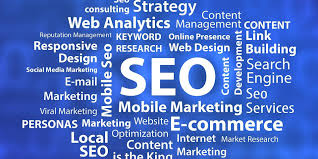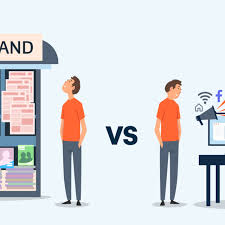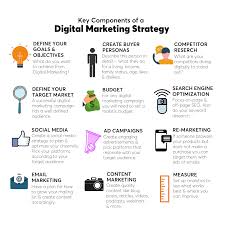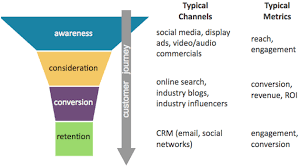The Power of Search Engine Marketing
Search Engine Marketing (SEM) is a powerful digital marketing strategy that aims to increase a website’s visibility in search engine results pages. It encompasses both organic search engine optimisation (SEO) and paid advertising tactics, such as pay-per-click (PPC) campaigns.
Key Components of SEM:
1. SEO: SEO focuses on improving a website’s organic search ranking by optimising its content, meta tags, and backlinks. By enhancing the site’s relevance and authority, SEO helps attract more organic traffic from search engines like Google.
2. PPC Advertising: PPC campaigns involve bidding on keywords relevant to your business and paying for ads to appear at the top of search engine results. These ads are cost-effective as you only pay when a user clicks on your ad, making it an efficient way to drive targeted traffic to your site.
The Benefits of SEM:
- Increased Visibility: SEM helps your website appear prominently in search results, increasing its visibility to potential customers.
- Targeted Traffic: By targeting specific keywords and demographics, SEM drives high-quality traffic to your site from users actively searching for your products or services.
- Measurable Results: SEM provides detailed analytics that allow you to track the performance of your campaigns and make data-driven decisions to optimise your strategy.
- Cost-Effective Advertising: With PPC advertising, you have control over your budget and can adjust bids based on performance, ensuring you get the most out of your marketing spend.
In Conclusion
Search Engine Marketing is a valuable tool for businesses looking to enhance their online presence and reach their target audience effectively. By combining SEO best practices with strategic PPC campaigns, businesses can drive qualified traffic to their websites and achieve measurable results in today’s competitive digital landscape.
Top 6 Benefits of Search Engine Marketing: Boosting Visibility, Traffic, and Brand Awareness
- Increased online visibility
- Targeted traffic generation
- Measurable results and analytics
- Cost-effective advertising options
- Enhanced brand awareness
- Competitive advantage in search engine rankings
Five Challenges of Search Engine Marketing: Navigating Costs, Competition, and More
- 1. Costly Investment
- 2. Competitive Landscape
- 3. Ad Blindness
- 4. Click Fraud
- 5. Constant Monitoring Required
Increased online visibility
Increased online visibility is a key advantage of search engine marketing. By implementing effective SEO strategies and running targeted PPC campaigns, businesses can significantly improve their presence in search engine results pages. This enhanced visibility not only helps attract more organic traffic but also ensures that the website is easily discoverable by potential customers who are actively searching for relevant products or services. Ultimately, increased online visibility through search engine marketing can lead to greater brand awareness, higher website traffic, and improved chances of converting visitors into loyal customers.
Targeted traffic generation
One of the key advantages of Search Engine Marketing is its ability to generate targeted traffic to a website. By strategically selecting relevant keywords and demographics, SEM ensures that the website appears in front of users actively seeking the products or services offered. This targeted approach not only increases the likelihood of attracting potential customers but also enhances the overall quality of traffic, leading to higher conversion rates and improved return on investment for businesses.
Measurable results and analytics
One of the key advantages of Search Engine Marketing is the ability to obtain measurable results and detailed analytics. By leveraging tools such as Google Analytics and other tracking platforms, businesses can gain valuable insights into the performance of their SEM campaigns. These analytics provide data on metrics like website traffic, click-through rates, conversion rates, and more, allowing businesses to assess the effectiveness of their marketing efforts accurately. With this information at hand, companies can make informed decisions to refine their strategies, allocate resources efficiently, and ultimately achieve better ROI from their SEM initiatives.
Cost-effective advertising options
One significant advantage of search engine marketing is the cost-effective advertising options it offers. With pay-per-click (PPC) campaigns, businesses have control over their budget and only pay when a user clicks on their ad. This means that companies can reach a targeted audience without incurring high costs upfront, making SEM an efficient and affordable way to drive traffic to their websites and generate leads.
Enhanced brand awareness
Search Engine Marketing (SEM) plays a crucial role in enhancing brand awareness by increasing a company’s visibility in search engine results. By strategically targeting relevant keywords and appearing at the top of search pages, businesses can boost their brand recognition among potential customers. This heightened visibility not only drives more traffic to the website but also establishes the brand as a credible and authoritative presence in its industry. With SEM, businesses can effectively showcase their products or services to a wider audience, ultimately strengthening brand awareness and loyalty.
Competitive advantage in search engine rankings
One significant advantage of Search Engine Marketing is the ability to gain a competitive edge in search engine rankings. By implementing effective SEM strategies, businesses can improve their visibility and ranking positions in search engine results pages ahead of their competitors. Securing higher rankings not only increases brand visibility but also enhances credibility and trust among users, ultimately driving more organic traffic to the website. This competitive advantage in search engine rankings can lead to increased brand recognition, customer engagement, and ultimately, higher conversion rates for businesses striving to stand out in the digital landscape.
1. Costly Investment
Search Engine Marketing, particularly PPC advertising, can pose a significant challenge due to its costly nature. To secure top ad placements and effectively compete in the digital landscape, businesses often need to allocate a substantial budget. This financial investment can be daunting for smaller companies or those with limited resources, making it a con of Search Engine Marketing that needs careful consideration and strategic planning to ensure a positive return on investment.
2. Competitive Landscape
In the realm of Search Engine Marketing, one significant drawback is the fiercely competitive landscape it presents. Small businesses often find it challenging to distinguish themselves amidst larger competitors with substantial marketing budgets. The intense competition for ad placements and keywords can drive up costs and make it harder for smaller players to achieve prominent visibility in search engine results. This dynamic nature of the SEM space requires strategic planning and innovative approaches for smaller businesses to carve out their niche and compete effectively in the digital arena.
3. Ad Blindness
One significant drawback of search engine marketing is the phenomenon of ad blindness, where users become accustomed to ignoring paid search results. In a digital landscape saturated with advertisements, users may develop a tendency to overlook paid listings and instead gravitate towards organic search results or other types of online content. This can diminish the effectiveness of SEM campaigns, as businesses may struggle to capture the attention of their target audience amidst the abundance of paid advertising. Marketers need to be mindful of ad blindness and employ strategies that enhance the visibility and relevance of their paid ads to combat this challenge effectively.
4. Click Fraud
One significant drawback of Search Engine Marketing, particularly in Pay-Per-Click campaigns, is the issue of click fraud. Click fraud involves malicious activities such as competitors or automated bots clicking on ads repeatedly to exhaust your advertising budget without generating legitimate leads. This unethical practice not only wastes resources but also distorts campaign performance metrics, making it challenging for businesses to accurately assess the effectiveness of their marketing efforts and achieve a positive return on investment.
5. Constant Monitoring Required
One significant drawback of Search Engine Marketing is the constant monitoring and adjustment it demands to maintain competitiveness and achieve optimal performance. Effective SEM campaigns necessitate regular scrutiny and fine-tuning to keep up with evolving trends and algorithms. This continuous need for monitoring requires a significant investment of time and effort, making it a resource-intensive aspect of SEM that can be challenging for businesses to sustain in the long run.









